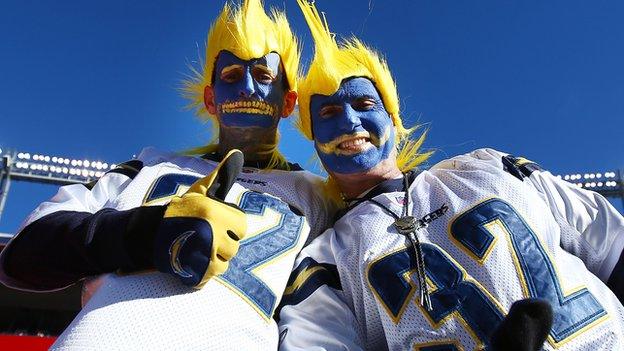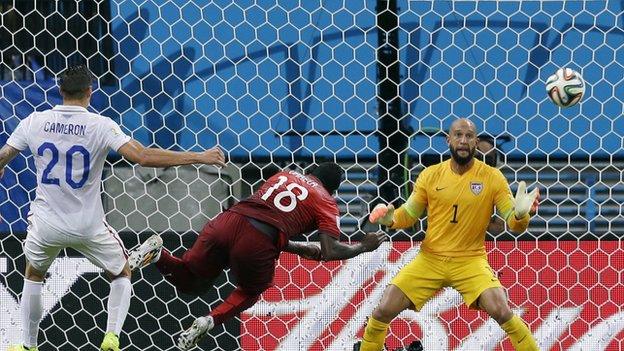Winning by losing: The (un)American way?
- Published
- comments

On Thursday the US men's national soccer team won by losing. Despite a 1-0 defeat at the hands of a powerhouse German side, the Americans advanced to the knockout round of the World Cup thanks to Portugal's 2-1 victory over Ghana.
The various mathematical permutations and convoluted tiebreakers had many Americans scratching their heads. And despite the fact that the US World Cup games have been posting record viewership numbers for football, those critical of the sport have been quick to throw cold water on celebrations by disparaging a system that allows losing teams to advance.
"Don't really understand soccer," tweeted, external KP Anderson, executive producer for the entertainment show the Soup. "How many games do we have to tie or lose before we win the World Cup?"
Matt Goldich, a writer for Seth Meyers's late-night talk show, tweeted, external: "US loses to Germany in World Cup, advances to Round of 16 anyway. Because in American soccer, you get a trophy just for participating."
"Nothing says we're number one more than choking in the final minute of one game and then getting shut out in the next," said, external ESPN's Keith Olbermann. "I believe that we can win - even though we got here by tying and losing."
"Are we this desperate as a nation for good international news that we're convincing ourselves this isn't embarrassing?" he added.
Sky Kalkman posted a chart, external on Twitter for "how you win a baseball game" - a simple line in which you either win, lose or play more innings.
And then there was "Rill Dill", who posted this, external this on a forum hosted by the American football site Eleven Warriors:
This is the United States of America. We do not play for ties, or celebrate advancing solely because another team lost. We do not celebrate when we lose 2 out of 3 ANYTHING. We are taught this upon exiting the WOMB. This (game) will NEVER go mainstream in this country, because of this.
Never mind the fact that Rill Dill can't even get the US World Cup record right (one win, one loss, one tie), he - and others who took to Twitter and their blogs to proclaim the superiority of US sports - probably should take a step back and think about what they're saying.
In US sports, it's not unusual for a team to find itself in a situation where it either has to win a game or hope for help.

San Diego Chargers fans could have benefitted from a chart to explain their team's chances for advancement last NFL season
It happens in the National Football League all the time, for instance.
Just last season, the San Diego Chargers, Miami Dolphins, Pittsburgh Steelers and Baltimore Ravens all entered the final game of the season with a chance to make the playoffs. Here's just a taste of some of the possible permutations, as outlined, external by the International Business Times:
Should the Ravens, Dolphins, and Chargers all lose, then the Ravens would advance. Baltimore will also make the play-offs if they win, and the Dolphins lose. Another scenario for the Ravens to advance is if they win, the Dolphins win, and the Chargers lose.
Seems like something a nice chart could help explain.
In 2004 the New York Jets needed a win against the St. Louis Rams to clinch a play-off spot. They lost, but ended up advancing anyway after the Pittsburgh Steelers topped the Buffalo Bills later that day.
The same can, and does, happen at the end of a baseball regular season, as fans of teams pore over the magic number of wins and opponents' losses needed to advance to the play-offs. Dedicated fans spend about as much time scoreboard watching as they do actually watching their own squad play.
Sure, some might say, that's the regular season, and not a play-off. But the round-robin stage is, in effect, the World Cup's regular season - it's just not spread out over 17 weeks, as in the NFL, or baseball's 162 games.
It's all a matter of perspective.
"I'm not sure I'd want to be the Portugal News sportswriter assigned to break down, say, the tiebreaker system for the NFL play-offs," writes, external John McGrath of the Tacoma News Tribune.
Once you get into the post-season tournament in professional baseball, hockey and basketball, the competition is a best of five or best of seven series. A team can lose three games in a row and still survive long enough to right their ship. Just ask the 2004 Boston Red Sox.
While play-off losses aren't something to cheer about, they aren't the end of the world, either (as the Daily Mirror sharply notes in its reply, external to Sky Kalkman's baseball victory chart).
US professional sports aren't the worst offender, however. In college football, a team can get dismantled in its conference championship game and play for the national championship (Oklahoma, 2003), or not even qualify for its conference championship and play for a title (Alabama, 2011) or not even play for its conference championship AND get blown out in its last regular season game and still advance (Nebraska, 2001).
Of course, US college football fans will note that the sport's post-season tournament rules are changing this year, as the top four teams will play in a head-to-head tournament where the winner advances, the loser is knocked out and there are no ties.
And how are these four teams chosen? By a conclave of college football elders who pore over stats and polls, issuing their final pronouncement after gathering behind closed doors.
If we took the top four teams based on Fifa's pre-World Cup rankings, we'd have a tournament comprised solely of Spain, Germany, Brazil and Portugal.
And this is better how?
- Published23 June 2014

- Published26 June 2014

- Published26 June 2014
